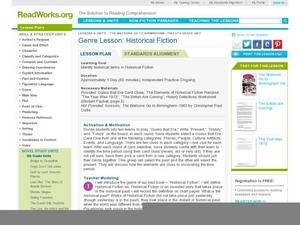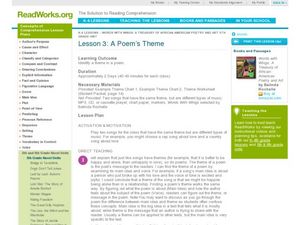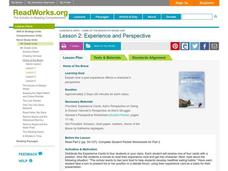Curated OER
Genre Lesson: Historical Fiction
Take a trip through history with a lesson on historical fiction. With instructions for games, reading activities, and literary analysis assignments, this resource would be a great addition to any reading unit with a historical fiction...
Curated OER
Mysterious Plot Problems
Your readers explore plot patterns in mysteries by identifying problems first in Two-Minute Mysteries by Donald J. Sobol and then in The Westing Game by Ellen Raskin. To gain access to the worksheets, graphic organizers and riddles...
Curated OER
Thinking about Theme
Sixth graders explore theme in science fiction texts by examining how plot conflicts are resolved. This resource focuses on Madeleine L'Engle's A Wrinkle in Time, but the approach and guiding questions could apply to a variety of texts.
Curated OER
Events and Effects
Explore the plot structure in biographies. First, read the biography The Story of Jackie Robinson, Bravest Man in Baseball and identify specific events that possibly changed the life of Jackie Robinson. As you guide your listeners, they...
Curated OER
A Poem's Theme
Show young poets how to use the main idea and voice to determine the theme of a poem. Model the steps using Listen Children. Lucille Clifton’s This Morning provides guided practice. Finally, class members use Nikki Giovanni’s Legacies...
Curated OER
Using Plot Elements to Retell a Story
The stories in Sandra Cisneros’s The House on Mango Street form the basis for a lesson on plot elements. The class examines introduction, sequence, problem, rising action, climax, falling action and resolution and identifies these...
Curated OER
Lesson 5: Theme Matters
Young scholars explore themes in fiction with this literacy comprehension lesson. They generate ideas for possible themes developed in the fairy tale of The Ant and the Cricket. Next, they examine the plot of The Great Gilly Hopkins and...
Curated OER
Multiple Perspectives
Analyze multiple perspectives in short stories. Sixth graders examine the point of view of each major character in three different short stories. After reading the stories, they role-play characters and hypothesize about the character's...
Curated OER
Genre Lesson: Science Fiction
Sixth graders explore the components of science fiction in a science and literacy lesson. As they define and record definitions of the term on the board, learners identify a text as science fiction using the terms they have listed to...
Curated OER
Genre Lesson: What is a Mystery?
Examine the elements in a mystery with The Westing Game. Learners unscramble words as if they had to put clues together. Additionally, they discuss terms used in mysteries. They practice the word using the context of the story, as well...
Curated OER
Identifying Symbols
Sixth graders explore the meanings of symbols. After creating a symbolism match game, they work on analyzing symbolism in their reading. Next, they read text and record concepts that are being repeated through the story, and use their...
Curated OER
Author's Opinion
Students complete a worksheet. In this author's opinion lesson, students learn how to determine an author's opinion when it is not explicitly stated in the text. Students answer fact and opinion questions and use them to draw...
Curated OER
The Similarities and Differences of Setting
Sixth graders compare science fiction to reality. In this setting lesson students use Chapter 6 of A Wrinkle in Time by Madeleine L'Engle. Students record detailed descriptions from the text that are different of similar to real life.
Curated OER
Lesson 4: Fact and Opinion - Rosa Parks: My Story
Sixth graders examine implicit and explicit opinions in a text about Rosa Parks. In this explicit and implicit opinions lesson, 6th graders participate in direct teaching, guided practice, and independent practice while reading an...
Curated OER
Genre Lesson: Narrative Poetry
Sixth graders complete a worksheet. In this poetry lesson, 6th graders learn about the differences between narrative poetry and lyric poetry. Students read poems and determine which form of poetry they are as well as identify...
Curated OER
Interpreting a Symbol
Sixth graders discuss symbols from the story, A Wrinkle in Time. In this language arts lesson, 6th graders discuss meanings and symbols of different characters. Additionally, students create a class list with details about the characters...
Curated OER
Experience and Perspective
Sixth graders consider how one's prior experiences influence perspective. For this experience and perspective lesson, 6th graders discuss their personal experiences and examine those of a character in the text Home of the Brave. Students...
Curated OER
The Similarities and Differences of Setting
Sixth graders identify components of the setting in science fiction text. In this compare and contrast settings lesson, 6th graders read Only You Can Save Mankind and identify similarities and differences between science fiction text and...
Curated OER
Mysterious Plot Problems
Students explore the plot of mystery books. In this genre study instructional activity, students read the book, Sammy Keyes and the Hollywood Mummy and listen to a read aloud of a chapter from the text. Students fill in a graphic...
Curated OER
Identifying Clues to Help Solve a Mystery
Sixth graders identify clues to solve a mystery. In this details lesson, 6th graders read from Sammy Keyes and The Hollywood Mummy and consider key details or items that would provide a clue to solve the mystery. Students write their...
Curated OER
Genre Lesson: Autobiography
Have your middle schoolers write a short story about themselves with an autobiography unit about Rosa Parks. They learn the difference between biographies and autobiographies, define the different types of autobiographies and determine...
Curated OER
Pictures, Photographs, and Captions
"How do photographs contribute to an autobiography?" Laurence Yep's The Lost Garden provides learners with an opportunity to examine how photos and their captions contribute to and clarify events in a story. Class members use expressive...
Curated OER
Textual Analysis Lesson: Taking Stock of the Stock Market
In this reading comprehension lesson, 6th graders read and analyze the novel, The Westing Game, by Ellen Raskin. Students, after reading chapters 3-5, answer 8 reading comprehension questions about the stock market. Students add on to...
Curated OER
Character's Motive
Create a list of possible suspects for a crime based upon each character's motivation. Middle schoolers discuss the motives of each main character in The Westing Game by Ellen Raskin. This lesson is part of a larger unit on this novel.

























